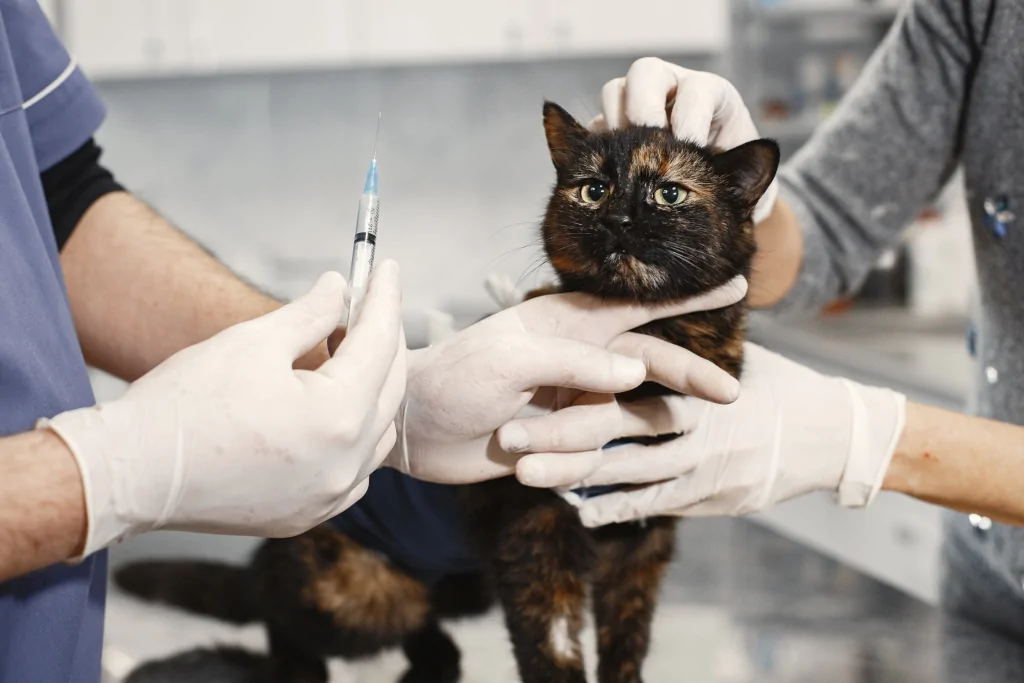Taking your beloved feline friend to the vet can be a daunting task, especially when you’re unsure if you’ve found the right veterinary professional for your pet’s needs.
That time I discovered a mysterious lump on Smokey, my heart raced as I searched for a vet who would be attentive, knowledgeable, and gentle.
Navigating the world of veterinary care can be overwhelming, but finding the perfect vet is a crucial part of ensuring your cat’s long-term health and happiness. We’ve got the inside scoop on how to find a purr-fect match for you and your kitty, so stick with us as we guide you through the process.

Why is Finding a Good Vet Important for Your Cat?
Securing a good vet for your cat is essential, as it directly impacts their overall health and wellbeing.
A skilled, compassionate vet can identify potential health issues early on, provide effective treatment, and give you valuable advice on how to maintain your cat’s health.
In turn, this can help prevent more serious problems down the line, saving you money, time, and emotional distress.
More importantly, a good vet will make your cat feel at ease, ensuring a more positive experience for you and your furry companion. So, let’s get started on finding the best vet to meet your cat’s needs and keep them purring with contentment.
How to Find a Vet: Recommendations and Research
Finding the right vet for your cat is crucial for their health and happiness. In this section, we will explore various methods to help you find a reliable and experienced veterinarian.
1. Start with Word of Mouth
When I first brought Smokey home, I was eager to find a vet I could trust. I reached out to my friends and family for recommendations and was relieved to find a fantastic vet who had successfully treated my cousin’s cat for a rare health condition. Their firsthand experience and understanding of my priorities made their suggestion invaluable.
Asking friends, family, or coworkers with cats for their recommendations can be a great way to find a reliable vet.
Their personal experiences can give you insights into the vet’s bedside manner, communication, and quality of care provided. Since they know you well, their suggestions will likely align with your priorities and concerns.
2. Consult Local Cat Organizations
Reaching out to local cat shelters, rescues, or clubs can also provide you with trustworthy recommendations. These organizations work closely with veterinarians and can often point you in the direction of a vet with a strong reputation for treating cats.
3. Online Research and Reviews
Take advantage of the internet to research potential vet clinics in your area. Start your research by using Google or Bing to find local vet clinics, then visit their websites and check online reviews from other cat owners.
Browse through their websites, looking for information on their services, staff qualifications, and facilities.
Check out online reviews and testimonials from other cat owners to get a sense of how the clinic operates and what you can expect from their care.
4. Verify Credentials and Specializations
It’s essential to ensure that the vet you choose has the appropriate credentials, such as a degree from an accredited veterinary school and a valid license to practice.
You may also want to look for vets with additional certifications or specializations in feline medicine, as they’ll have more extensive knowledge of cat-specific health issues and treatments.
5. Schedule a Meet and Greet
Once you’ve narrowed down your options, consider scheduling a meet and greet with the potential vet.
A meet and greet is an initial, no-obligation appointment where you can introduce your cat to the potential vet, ask questions, and evaluate the clinic’s environment.
This will give you an opportunity to ask questions, observe how they interact with your cat, and evaluate the clinic’s environment. Bring your cat along to see how they respond to the vet and the overall atmosphere.
By following these steps, you’ll be well on your way to finding a vet who will provide the best possible care for your cat, just as I did for Smokey. It may take a little time and effort, but it’s well worth it in the end to ensure your cat’s health and happiness.
What to Look for in a Vet: Qualities and Credentials
Once you’ve gathered recommendations, it’s important to evaluate the qualities and credentials of potential vets. In this section, we will discuss the essential factors to consider when choosing the perfect vet for your cat.
Education and Licensing
First and foremost, ensure that the vet has a Doctor of Veterinary Medicine (DVM) degree from an accredited veterinary school and a valid license to practice in your state. This guarantees that they have the necessary education and training to provide your cat with proper care.
Experience and Specializations
A vet with experience treating cats is crucial, as they will have a better understanding of feline-specific health issues.
If your cat has unique needs or health concerns, look for a vet with additional certifications or specializations, such as feline medicine or internal medicine.
Communication Skills
Effective communication is essential when it comes to your cat’s care. A good vet should be able to clearly explain diagnoses, treatment options, and any potential risks. They should also be open to answering your questions and addressing your concerns.
Empathy and Compassion
An empathetic and compassionate vet will create a comfortable and stress-free environment for both you and your cat. They should be patient, gentle, and understanding when handling your cat, as well as attentive to your concerns as a cat owner.
Availability and Accessibility
The vet you choose should have office hours that fit your schedule and be available for emergencies or consultations when needed.
Their clinic should be conveniently located and have appropriate facilities for treating cats, such as separate waiting areas or exam rooms.
Support Staff and Clinic Atmosphere
A great vet clinic is more than just the vet – it’s also the support staff, including technicians and receptionists. They should be knowledgeable, friendly, and efficient. Observe the overall atmosphere of the clinic, ensuring it’s clean, organized, and welcoming.
By considering these qualities and credentials, you can find a vet who not only has the expertise to care for your cat but also establishes a trusting and comfortable relationship with both you and your feline friend.
Questions to Ask During Your First Vet Visit
Your cat’s first vet visit is an opportunity to get to know the veterinarian, gather information, and address any concerns you may have. Here are some questions you can ask to make the most of your visit:
- What vaccinations does my cat need, and what is the schedule for booster shots?
- How can I ensure my cat has proper dental care?
- What flea, tick, and heartworm prevention methods do you recommend?
- Can you recommend a suitable diet for my cat’s age, weight, and activity level?
- How can I identify signs of common illnesses in cats, and when should I seek veterinary care?
- What is your approach to pain management and anesthesia during procedures?
During Smokey’s first visit, I asked the vet about her experience with feline nutrition. She provided helpful advice on transitioning to a new diet, which significantly improved Smokey’s coat and overall health. I knew then this was the vet I probably wanted to stick around with.
Evaluating the Vet Clinic Environment
A comfortable and welcoming environment is crucial for both you and your cat. Here are some factors to consider when evaluating the clinic:
- Cleanliness. A well-maintained clinic is essential for preventing the spread of infections and ensuring a sanitary space for your cat’s treatment.
- Noise Level. Cats are sensitive to noise, so a quiet and calm environment can help reduce stress during the visit.
- Waiting Area. A separate waiting area for cats can be beneficial, as it minimizes interactions with other animals that might cause anxiety.
- Equipment and Facilities. Check if the clinic has up-to-date equipment, such as digital X-rays and in-house laboratory services. These can be crucial in providing comprehensive care for your cat.
- Staff Attitude. Observe how the staff interacts with you, your cat, and other clients. They should be professional, friendly, and compassionate.
By paying attention to these factors, you can ensure a positive experience for both you and your cat, and feel confident in the care they’ll receive at the clinic.
Developing a Strong Relationship with Your Vet
Establishing a strong relationship with your vet is vital for your cat’s long-term health and well-being.
Communication is key: keep your vet informed about any changes in your cat’s behavior or health, and don’t hesitate to ask questions or voice concerns. Schedule regular check-ups, and consider calling or emailing your vet between visits to maintain an open dialogue.
I remember when Smokey had a sudden change in appetite… I reached out to our vet, and she promptly addressed the issue, adjusting his diet and providing valuable advice.
By working closely with your vet, you’ll be better equipped to make informed decisions and provide the best care for your feline friend.
When and How to Seek a Second Opinion
Seeking a second opinion is essential if you’re uncertain about a diagnosis, treatment plan, or if your cat’s condition isn’t improving as expected. We have more advice on choosing another vet in our blog post on what to do if your vet misdiagnosed your cat.
Typically, you would start by discussing your concerns with your current vet and request a referral to another vet, if necessary. Research other clinics in your area, focusing on those with expertise in your cat’s specific condition.
Gather relevant medical records and communicate openly with the second veterinarian, ensuring they have all the information they need to provide an informed opinion.
For more valuable information on your cat’s health and well-being, be sure to check out our other guides on preparing for your first vet visit, reducing stress-free vet visits, and the basics of vaccination schedules.
FAQs
How often should I take my cat to the vet for check-ups?
Adult cats should have a check-up at least once a year, while kittens and senior cats may require more frequent visits. Kittens should see a veterinarian every 3-4 weeks until they are about 4 months old, while senior cats should have check-ups every six months to monitor their health more closely.
Should I choose a feline-specific vet or a general practice?
Both options have their merits, but choosing a feline-specific vet can provide specialized knowledge and experience in treating cats, which may be beneficial for complex health issues.
How can I handle a nervous cat during vet visits?
Use a comfortable carrier, bring a familiar blanket or toy, and consider using calming sprays or treats to help reduce anxiety during vet visits. Check our easy-to-follow guide on stress-free vet visits with tips to help your cat remain calm during vet visits.
What should I do if I need to switch vets?
Research and find a new vet clinic that meets your requirements, obtain your cat’s medical records from the previous vet, and schedule an introductory appointment with the new vet to discuss your cat’s health history and needs. Read this blog post to find more advice on this.
Alex, a passionate animal lover, has experience in training and understanding animal behavior. As a proud pet parent to two dogs and three cats, he founded AnimalReport.net to share insights from animal experts and expand his knowledge of the animal kingdom.




